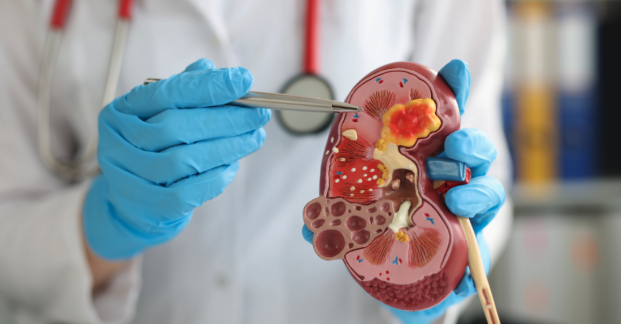
Urology is a medical field that covers a range of conditions affecting the urinary tract and male reproductive system. While general urologists treat many common conditions, some patients require more specialized care.
The American Urological Association identifies seven different subspecialties within urology, highlighting the importance of this organization in the education and certification process for urologists.
At Western Reserve Hospital, our team of urologists provides treatment for a range of issues from kidney stones to prostate cancer. In this article, Dr. Zane Giffen explains the different subspecialties of urology and when you might need a specialist.
What Are the Different Specialties in Urology?
Not all urologists focus on the same conditions. Dr. Giffen explains, "About 60% of practicing urologists in the U.S. are general urologists, but complex cases often require subspecialists."
While general urologists handle urinary infections, kidney stones, and bladder problems, some cases require highly focused expertise. At Western Reserve Hospital, the urology department treats a wide variety of conditions, working with other departments when beneficial to provide comprehensive and holistic care for all patients.
Here’s an overview of the main subspecialties of urology and what they treat.
Reconstructive Urology: Restoring Function After Trauma or Disease
Reconstructive urologists repair damage to the urinary tract caused by trauma, birth defects, previous surgeries, or chronic diseases.
Dr. Giffen explains, "Reconstructive urology is essential for patients with significant urinary damage, offering procedures that can dramatically improve their quality of life."
Common Conditions Treated by Reconstructive Urologists:
- Urethral strictures – Scar tissue in the urethra can cause narrowing, leading to painful urination, weak urine flow, or complete blockage. Reconstructive urologists perform procedures such as urethroplasty or dilation to remove the scar tissue and restore proper urine flow.
- Bladder dysfunction from spinal cord injuries – Patients with spinal cord injuries often lose bladder control due to nerve damage. Reconstructive urologists offer treatments such as bladder augmentation or artificial urinary sphincters to help patients regain bladder function.
- Pelvic trauma reconstruction – Accidents, previous surgeries, or cancer treatments can damage the urinary tract, making urination difficult or painful. Specialists in reconstructive urology perform complex surgeries to rebuild the bladder, urethra, or other structures.
- Urinary fistulas – Abnormal connections between the urinary tract and other organs, such as the bladder and vagina or rectum, can cause incontinence and recurrent infections. Surgical correction is often necessary to close these openings and restore normal function.
These specialists perform procedures such as urethroplasty (urethral reconstruction), artificial urinary sphincters, and bladder augmentation to restore normal function.
Urologic Oncology: Specialized Cancer Treatment

Urologic oncologists diagnose and treat cancers of the urinary tract and male reproductive system, including:
- Kidney cancer – Kidney tumors can range from slow-growing cysts to aggressive cancers. Treatment options include robotic-assisted surgery to remove the tumor while preserving kidney function, as well as newer targeted therapies for advanced cases.
- Bladder cancer – Symptoms such as blood in the urine often indicate bladder cancer, which requires prompt evaluation. Depending on the stage of the cancer, treatments can include minimally invasive surgery, chemotherapy, or immunotherapy.
- Prostate cancer – Prostate cancer is one of the most common cancers in men. Urologic oncologists use MRI-guided biopsies and genetic testing to determine the best treatment plan, which may involve active surveillance, radiation, or robotic-assisted surgery.
- Testicular cancer – Testicular cancer is highly treatable, especially when detected early. Urologic oncologists perform orchiectomies (removal of the affected testicle) and coordinate with oncologists for further treatment if necessary.
Advancements in Urologic Cancer Treatment: Prostate Cancer
The field of urologic oncology has seen major improvements in early detection and treatment options. At Western Reserve Hospital, our urology and oncology departments work closely together to make sure that cancer patients receive comprehensive care that uses the latest advancements in medical technology.
Dr. Giffen highlights, "Urologic oncology is one of the most rapidly advancing fields, with new techniques allowing for earlier detection and more personalized treatments."
Some of the latest advancements include:
- MRI-guided prostate biopsies – Providing more precise detection of prostate cancer.
- Robotic-assisted surgery – Allowing for less invasive kidney, bladder, and prostate cancer surgeries.
- Genetic testing for prostate cancer – Helping doctors determine a patient’s risk and best treatment options.
If a person experiences blood in the urine, abnormal PSA levels, or unexplained testicular lumps, they should see a urologic oncologist for further evaluation.
Kidney and Urinary Tract Stones: Managing Painful Blockages
Kidney stones are one of the most common and painful conditions treated by urologists. These hard mineral and salt deposits can form in the kidneys and travel through the urinary tract, causing significant discomfort and potential complications if not treated.
Many people believe that kidney stones predominantly affect men, but Dr. Giffen explains that, “by age 70, about 1 in 16 women will experience kidney stones.”
Common Treatments for Kidney and Urinary Tract Stones:
- Shock wave lithotripsy (SWL) – A non-invasive procedure that uses sound waves to break stones into smaller pieces, making them easier to pass naturally through the urine.
- Ureteroscopy – This minimally invasive procedure involves guiding a thin scope through the urethra and bladder into the ureter to locate and remove or break up stones using laser technology.
- Percutaneous nephrolithotomy – Used for larger or complex kidney stones, this surgical approach involves making a small incision in the back to access and remove the stones directly from the kidney.
- Medical management – Urologists may recommend medications and dietary changes to help prevent stone formation, especially for patients who experience recurrent kidney stones.
Patients often experience symptoms such as intense flank pain, blood in the urine, nausea, or difficulty urinating when dealing with kidney stones. A urologist can provide imaging tests and a personalized treatment plan based on the size, type, and location of the stones.
Men’s Health (Andrology): Treating Male Sexual and Reproductive Health
Andrology focuses on male fertility, sexual health, and hormone-related conditions. These specialists diagnose and treat conditions that affect testosterone levels, erectile function, and sperm production.
Andrologists also diagnose and treat conditions affecting the male reproductive organs, including the testes and prostate gland.
Common Conditions Treated by Andrologists:
- Erectile dysfunction (ED) – This condition can stem from vascular disease, nerve damage, or hormone imbalances. Andrologists offer treatments such as oral medications, penile injections, and surgical implants for severe cases.
- Male infertility – Infertility in men can be due to low sperm count, varicoceles (swollen veins in the scrotum), or genetic conditions. Treatments include microsurgical sperm retrieval, hormone therapy, and assisted reproductive techniques like IVF.
- Testosterone deficiency (Low T) – Low testosterone can cause fatigue, low libido, muscle loss, and mood changes. Andrologists evaluate hormone levels and prescribe testosterone replacement therapy if necessary.
- Peyronie’s disease – This condition occurs when scar tissue forms in the penis, causing painful curvature and difficulty with intercourse. Treatments include medications, injections, and surgical procedures to remove scar tissue.
- Enlarged prostate – Urodynamic studies evaluate urinary issues associated with an enlarged prostate, and various treatments, including laser therapy, are available to reduce an enlarged prostate.
Dr. Giffen emphasizes, “For many men, seeking help for sexual health conditions can be difficult, but effective treatments are available.” The urology team at Western Reserve Hospital treats a wide variety of men’s health issues.
Treatment options include hormone therapy, microsurgical sperm retrieval, and penile implants for severe erectile dysfunction.
Female Urology: Bladder Health and Pelvic Floor Disorders

Women commonly experience urinary problems and pelvic floor disorders, which can significantly impact their quality of life. While some of these conditions are treated by gynecologists, female urologists specialize in urinary health concerns. At Western Reserve Hospital, our women’s health specialists treat a wide variety of urologic conditions, including:
- Urinary incontinence – Women may experience stress incontinence (leakage when coughing or sneezing) or urge incontinence (sudden, strong urges to urinate). Female urologists offer treatments such as pelvic floor therapy, bladder training, and minimally invasive surgery.
- Pelvic organ prolapse – This condition occurs when the bladder, uterus, or rectum shifts out of place due to weak pelvic muscles. Treatments include pessary devices, pelvic exercises, or surgical procedures to restore normal anatomy.
- Interstitial cystitis (painful bladder syndrome) – Women with this condition experience chronic bladder pain and frequent urination without infection. Female urologists help manage symptoms with dietary changes, medication, and bladder training techniques.
Many women assume that bladder leakage is a normal part of aging, but effective treatments exist.
Dr. Giffen notes, "Many women put up with bladder control problems for years without realizing that simple treatments can improve their symptoms."
When Should You See a Urology Specialist?
If you are experiencing any of the following symptoms, it may be time to see a urologist:
- Blood in the urine
- Frequent kidney stones
- Bladder control problems
- Erectile dysfunction or male infertility
- Pelvic pain or prolapse
Dr. Giffen advises, “Any visible blood in the urine requires a urologic evaluation, as it can be a sign of cancer.”
Early diagnosis and treatment can prevent more serious complications.
Contact Western Reserve Hospital for Expert Urology Care
The urology specialists at Western Reserve Hospital provide comprehensive care for men and women dealing with urinary and reproductive health concerns.
If you or a loved one is experiencing urinary symptoms, kidney stones, or male/female reproductive concerns, don’t wait to seek medical advice. Early diagnosis leads to better outcomes.
Contact Western Reserve Hospital today to schedule an appointment with a urology specialist.
